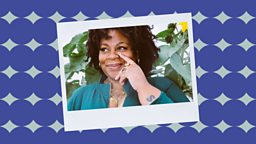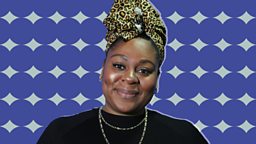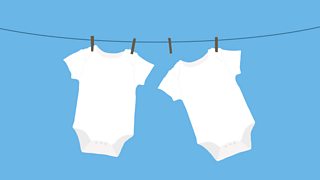‘I try to be as real as possible’: Eight things we learned from Candice Carty-Williams on Woman’s Hour

Candice Carty-Williams is best known for her debut novel Queenie, which she described as 'the Black Bridget Jones'. It followed the story of 25-year-old South Londoner Queenie trying to make her way in the world against enormous odds.
The book sold more than 500,000 copies and won Book Of The Year at the British Book Awards in 2020, making her the first Black author to win the award. Her new novel, People Person, looks at family relationships.
Candice joined Emma Barnett on ±«Óãtv Radio 4’s Woman’s Hour to talk about her new novel, her South London roots, and why it’s so important to her to publish novels that other Black women can relate to.
Emma and Candice also discussed the safety of women and girls in society, the adultification of Black girls and why we should value ‘found families’ more. Here are some of the things we learned from their conversation…
1. After writing Queenie, she decided it was time to write a book that focused solely on black people and their experiences
“Queenie was in response to whiteness,” says Candice. “It’s all about this girl trying to straddle two cultures and one of those cultures is white culture. She's trying and failing very often at this newspaper that is run by white people. She's trying to talk about Black stories, and they're not interested. She's dating white men and seeing how they're treating her, and her body is failing her and her mental health. I've done that now. I’ve worked that through and now it's time to be like, ‘Let's focus on this family of people.’ And it felt good.”

2. She thinks we should stop ‘doing fractions’ when talking about family and appreciate ‘found families’ more
“I have a lot of found family and that's really, really important to me," says Candice. "A lot of people I would say, that’s just my sister. I have half siblings. I have step siblings.
“One of my step siblings, I have no ties to him anymore in terms of our parents, but he's my brother. If anything happens, he's the first person I call. I can't imagine being like, ‘Oh, that's my stepbrother’ and he would never refer to me as a step-sis. That's just my family. It's basically my blood at this point. I think that's really important.”
3. She is very proud of her identity as a South Londoner. She describes herself as a ‘scrappy south London girl’. ‘The self control is high, but so is the temper. I’m not one of those they go low, we go high people.'
“Soon I think I'm gonna snap, because I am honestly so scrappy," says Candice. "I’m from South London. I do a lot of therapy to hold a lot of stuff down. But I just have to do deep breathing all the time. If you see me anywhere, I'm usually doing deep breathing, because someone has done something very annoying.
“I even have to keep crystals in my car, because driving around South London is the worst. I'm always ready to fight someone. I've almost gotten into a fight so many times. But I don't want to be seen as an angry Black woman, even though I think that Black women often have a right to be angry.”
4. She thinks adultification is nothing new. Black girls are still more likely to be treated like adults and often inappropriately sexualised
“It's been happening to me since I was young,” says Candice. “I always see all of these weird polls going around on Twitter asking young Black women when they were first sexualised, and it's overwhelmingly nine to twelve years old. I remember the same thing happening to me.
“There is just this very strange disconnect that happens. It's a big societal one that is pushed up constantly that Black women are women from childhood. We do not have the grace or the time to be young and to be children. It's very pervasive and it's very damaging. And it's still happening all the time.
“Since I was like eight, it was just time to grow up and to parent and to be strong and to face everything. There were so many years of my life where I was not allowed to be a kid. There is so much we need to think about. We need to give attention to the damage that our families do.”

5. In People Person, she wrote about the lack of trust in the police, which she says is common in Black communities
“If something bad happened to me, I wouldn't call the police,” says Candice. “My car got smashed to pieces at the weekend and I was like: ‘Oh, I’ll fix it.’ I have no interest in the police. I don't trust the police. I know there are members of the police force who are good people. But as an institution, I have no trust for it and I don't know many Black people who do. The history of the police and Black people is absolutely horrifying.
“But it's not just Black communities. It's also Sarah Everard. I am haunted by that, as I'm sure many people are. This isn’t an institution that can be trusted. It needs to be rebuilt from the ground up.”
6. She writes honestly about real life scenarios because she thinks life is too short not to
“I try to be as real as possible in my writing, and also in my life,” says Candice. “Because I think that we have a limited time, we all do. It's important for all of the relationships that we have to be as legit as possible, I guess.
“I try to do that in my writing too because, as much as it's fiction, I also like to create something that is so close to real life that people can find themselves in it. I want them to understand what the characters are going through. I've already had so many messages from people being like, ‘Oh, my God, I never thought anyone would write about a family like mine.’ And that's important because that's why I do what I do.”

7. No matter how successful she becomes, she will always help when asked to pick up potatoes for her Nan
“She doesn't care about anything that I do," says Candice. "She's just like, ‘You are my granddaughter, and you are here to serve me.’ And that's absolutely right. If there's one woman on this planet that I'm here to serve, it’s Elaine Williams.
“She sees me as her little baby, and she always will. Whatever I do and whatever I say or however I act, she's seen me at every single stage. She's seen me very happy and seen me very low, but I'm always just her little baby. She tells everyone that I am her favourite out of everyone, even her children. It's got me in a lot of trouble.”
8. She will never move to the US
“I wanted to move [to America], then I went not long ago and I saw ten rats in one day. So, I'm not doing that anymore,” says Candice. “I'm just not. I didn't realise it was so bad. I had been there before, and it wasn't that bad. If there's anything in life I'm scared of, it is vermin. That's the only thing. So, I said no. Ten rats in one day? New York is not suiting me. I couldn’t.”
Listen to Candice Carty-Williams’ full interview with Emma Barnett on ±«Óãtv Sounds, where you can also find every episode of Woman’s Hour you may have missed. Follow us on and @bbcwomanshour.




